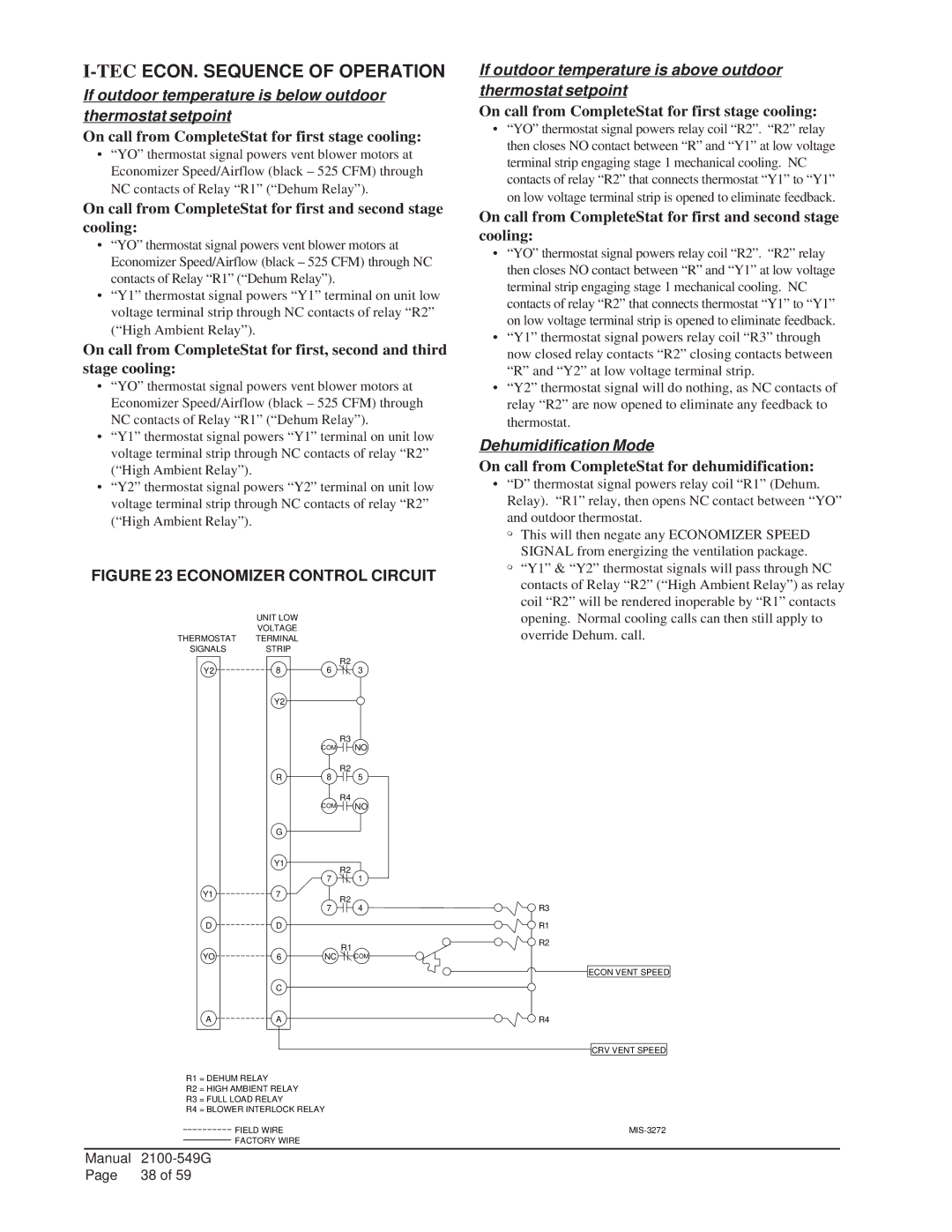
I-TEC ECON. SEQUENCE OF OPERATION
If outdoor temperature is below outdoor thermostat setpoint
On call from CompleteStat for first stage cooling:
•“YO” thermostat signal powers vent blower motors at Economizer Speed/Airflow (black – 525 CFM) through NC contacts of Relay “R1” (“Dehum Relay”).
On call from CompleteStat for first and second stage cooling:
•“YO” thermostat signal powers vent blower motors at Economizer Speed/Airflow (black – 525 CFM) through NC contacts of Relay “R1” (“Dehum Relay”).
•“Y1” thermostat signal powers “Y1” terminal on unit low voltage terminal strip through NC contacts of relay “R2” (“High Ambient Relay”).
On call from CompleteStat for first, second and third stage cooling:
•“YO” thermostat signal powers vent blower motors at Economizer Speed/Airflow (black – 525 CFM) through NC contacts of Relay “R1” (“Dehum Relay”).
•“Y1” thermostat signal powers “Y1” terminal on unit low voltage terminal strip through NC contacts of relay “R2” (“High Ambient Relay”).
•“Y2” thermostat signal powers “Y2” terminal on unit low voltage terminal strip through NC contacts of relay “R2” (“High Ambient Relay”).
FIGURE 23 ECONOMIZER CONTROL CIRCUIT
| UNIT LOW |
|
|
| VOLTAGE |
|
|
THERMOSTAT | TERMINAL |
|
|
SIGNALS | STRIP |
|
|
|
| 6 | R2 |
Y2 | 8 | 3 | |
| Y2 |
|
|
|
|
| R3 |
|
| COM | NO |
|
| 8 | R2 |
| R | 5 | |
|
|
| R4 |
|
| COM | NO |
| G |
|
|
| Y1 |
| R2 |
|
|
| |
|
| 7 | 1 |
Y1 | 7 |
| R2 |
|
| 7 | |
|
| 4 | |
D | D |
|
|
YO | 6 | NC | R1 |
COM |
C
AA
R1 = DEHUM RELAY
R2 = HIGH AMBIENT RELAY
R3 = FULL LOAD RELAY
R4 = BLOWER INTERLOCK RELAY
FIELD WIRE
FACTORY WIRE
If outdoor temperature is above outdoor thermostat setpoint
On call from CompleteStat for first stage cooling:
•“YO” thermostat signal powers relay coil “R2”. “R2” relay then closes NO contact between “R” and “Y1” at low voltage terminal strip engaging stage 1 mechanical cooling. NC contacts of relay “R2” that connects thermostat “Y1” to “Y1” on low voltage terminal strip is opened to eliminate feedback.
On call from CompleteStat for first and second stage cooling:
•“YO” thermostat signal powers relay coil “R2”. “R2” relay then closes NO contact between “R” and “Y1” at low voltage terminal strip engaging stage 1 mechanical cooling. NC contacts of relay “R2” that connects thermostat “Y1” to “Y1” on low voltage terminal strip is opened to eliminate feedback.
•“Y1” thermostat signal powers relay coil “R3” through now closed relay contacts “R2” closing contacts between “R” and “Y2” at low voltage terminal strip.
•“Y2” thermostat signal will do nothing, as NC contacts of relay “R2” are now opened to eliminate any feedback to thermostat.
Dehumidification Mode
On call from CompleteStat for dehumidification:
•“D” thermostat signal powers relay coil “R1” (Dehum. Relay). “R1” relay, then opens NC contact between “YO” and outdoor thermostat.
This will then negate any ECONOMIZER SPEED SIGNAL from energizing the ventilation package.
“Y1” & “Y2” thermostat signals will pass through NC contacts of Relay “R2” (“High Ambient Relay”) as relay coil “R2” will be rendered inoperable by “R1” contacts opening. Normal cooling calls can then still apply to override Dehum. call.
R3
R1
R2
ECON VENT SPEED
R4
CRV VENT SPEED
Manual | |
Page | 38 of 59 |
